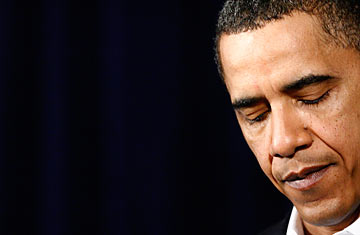
(4 of 6)
Now, I want to go back to your initial premise of us being close to Wall Street. We knew that this would be a consequence of us managing TARP. It was inevitable. One of the things that we have to do is just remind people that having inherited this financial disaster as well as the TARP structure, this thing was managed in as prudent a way as any financial-crisis management has ever been managed.
I think they'll give you that.
And what we're now doing, for example, on the fee on these big financial institutions is not designed to punish; it's just designed to meet what was in the legislation originally, which was: This was not going to cost taxpayers a dime's worth of money. Something, by the way, that nobody believed, but something that we may actually be able to deliver on.
With respect to financial reform: This was always one of our top agendas. I started talking about this during the campaign, and I made a major speech about how we're going to move forward [last] March. My hope had been that health care wouldn't take this long. And that we would've teed up both energy and financial reform before the end of the first year. If there's one thing I have learned — you asked earlier about something I've learned about this process — it always takes longer than you think.
Let me just close on financial regulatory reform. This is going to be a top priority. You are already seeing the big banks and some of these other interests lining up in opposition to basic core reforms, like making sure that consumers know what the fine print is when it comes to their credit cards or their debit cards or their mortgages. You're already seeing them resisting the idea that they should have a regulatory regime that isn't full of loopholes.
And my attitude is that this is a fight that is entirely consistent with what we've done last year, it's entirely consistent with who I am and how I campaigned, and it's a fight that I welcome. And it'll be interesting to see how some who have tried to exploit legitimate anger at the big banks this year by trying to put it on us are going to position themselves when in fact they're going to want to protect all these financial institutions from the regulations that will prevent the kind of disaster that we've seen over the past couple of years.
They're going to have to vote yea or nay, aren't they?
Right.
During the campaign, the one program that you proposed that everybody from the left to the right loved was the infrastructure bank. And it seems to me that was another thing that kind of fell by the wayside this year.
You're wrong about that. Well, you're right that people liked it.
But that's the good government fight. That's the fight against the appropriators in Congress.
You're absolutely right, and look, one of the things we've got to do better is to tell the story of what was in the [American Recovery and Reinvestment Act]. That was the largest investment in research and development in our history.
And it's coming online this year?
And it's moving. One constituency that I know is happy with me are scientists, inventors, entrepreneurs who are in the high-tech sectors, because they are seeing already the incredible investments that are happening that are going to have 20-, 30-year payoffs. It was the biggest investment in education. And it wasn't just the usual formulas. Some of it was helping to make sure teachers didn't get laid off, but what [Secretary of Education] Arne Duncan is doing with our Race to the Top Fund — we've already had 48 states react by implementing reforms that had been resisted for years. And you're starting to see the teachers' unions really think through how can they be a partner in the process of reform. And when it comes to infrastructure, not only was it the biggest investment in infrastructure since the Eisenhower Interstate Highway System, but we actually introduced the infrastructure-bank concept in the Recovery Act.
